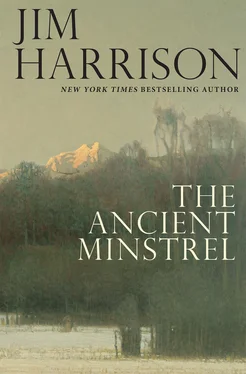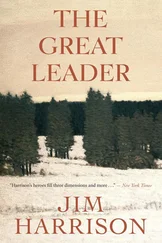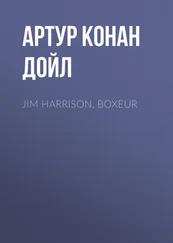Now they were all hungry sitting there eating olives and drinking cheapish Côtes du Rhône, and the Frenchwoman suggested they drive to their place across town and she could whip up a little supper. He dramatically yelled stop and got his half-finished casserole in its big blue Le Creuset from the fridge. His wife said to her, “We’ll heat it up. You’ll probably have to correct it.” He improvised finishing the Cassoulet de Canard and the Frenchwoman shrieked with delight, pronouncing it beautifully on her sibilant tongue. After that he would arrogantly try anything within or beyond his talents, usually French but quite a bit from northern Italy and the books of Mario Batali. He preferred the French but only because they were more versatile. This food obsession had lasted throughout his life, waxing and waning. A month of intense activity might be followed by a month of laziness with a few very simple Chinese meals thrown in. He loved the way cooking took over his mind and resolved the usual mental miseries which it always did. He suspected that it was the root of his sanity if there was one which was doubtful.
The clearest mystery of his childhood was water which led him to fishing. It was emotionally enriching like cooking later became. You started by hearing from a teacher that water was H2O which never meant a thing. High on the list of the loves in his life were rivers, the dozens he had fished and others he’d simply seen on road trips. The good fortune of his water obsession was growing up in northern Michigan which abounded in wild waters, lakes, ponds, creeks, rivers, and the Great Lakes. They visited the Great Lakes on an occasional excursion where you couldn’t see the other side, and there was the feeling that there might not be another side. His love of water became haunted from one of the many fibs his older brother, currently a university dean, had told him. His brother insisted that even puddles could be bottomless leading down to China where you would be beheaded with long swords like the Japanese did to GIs during World War II, photos of which his mother had saved from old Life magazines. Falling all the way through earth only to get your head chopped off was frightening indeed, the stuff of nightmares, but he realized his brother was just trying to scare him. His brother had also insisted that he had dreamed he would die in a river in South America strangled by an anaconda. This enormous snake captured his imagination at the Saturday afternoon serials at the movie theater in Reed City, in which a man named Frank Buck apparently had been attacked by every sizable creature on earth.
His lifetime of fishing began when he was about five and intensified considerably after his eye accident at the age of seven. His father had figured out that the only way to lift the melancholy of his little son was to take him fishing. They fished for trout on weekends on rivers when his dad was off work and during the week fished in the late afternoons and evenings at the cabin they lived at all summer long on a remote lake. His father and uncles built the cabin when the uncles returned from a very hard time in World War II in the South Pacific. He was impressed that they had built the lovely cabin for only a thousand bucks. The sound of rain on the tin roof was soothing to his eye which hurt a lot and after that he always identified a remote cabin with good feelings. A day never passed at the cabin without him fishing. Even when it was cold and windy he was bundled up and would let the wind carry him across the lake in heavy waters. Then he would have to strenuously row into the wind all the way home for dinner. Fishing was ordinarily not very pleasant in the high winds but he would screw up his eyes and imagine he was way up in Canada surrounded by polar bears.
He felt that rivers, birds, and forests had kept him alive and would continue doing so. His wife was far better than him at identifying birds but then she had far better eyesight. None of his friends were bird-watchers. They would try to tease him about the “sissy” sport. He would only answer obliquely that birds were the grandest facts of nature and life. When he was doing sports journalism fishing in Chile, Ecuador, Costa Rica, Nicaragua, Mexico it was altogether as pleasant as he thought it might be. He wanted to fish not write about fishing. It is often our conclusions that exhaust us. It also slowed him down that he had to hire guides for trout fishing because his vision was insufficient to tie on the tiny flies. Often, having a guide in the boat compromised the fishing. Guides want to talk about marriage and financial problems. He didn’t.
He had also been impassioned with bird hunting for several years, especially for the grouse and woodcock, less so the quail and doves of the South. He never cared for deer hunting and had shot a deer only once which proved to be sufficient. It was unpleasant to gut and skin them, a moral exercise. They were wonderful to eat but he discovered that when he quit deer hunting plenty of friends shared their own kill including the antelope and elk of Montana.
He had trained half a dozen dogs which was more enjoyable than actual hunting. There was a mutual joy between them when the dog totally caught on to pointing the scent and then retrieving the bird. A momentary thrill, the total comprehension between dog and man over what precisely they were doing. His English setter Tess, a truly elegant creature, would often do a prancing dance after retrieving a bird. And when they began hunting she would often take off at a very formal gait similar to what you see in American Saddlebred horses. He loved poems that gave him goose bumps, and the same thing could happen hunting over a fine dog.
Obviously so much of the pleasure of hunting and fishing came from where you were. You were utterly enveloped in the natural world. Sometimes when he was trout fishing his mind played the cello. And sometimes when he would bird hunt for eight hours the exhaustion and also the taste of the French red wine when he got back to the cabin would be exquisite. He usually had two friends at the cabin and they would prep for dinner at midday break then slowly cook it when they got back to the cabin. They all cooked elaborately but sometimes they only grilled birds and would have them with a cheese polenta and lots of wine.
Passacaglia for Staying Lost, an Epilogue
Often we are utterly inert before the mysteries of our lives, why we are where we are, and the precise nature of the journey that brought us to the present. This is not surprising as most lives are too uneventful to be clearly recalled or they are embellished with events that are fibs to the one who owns the life. A few weeks ago I found a quote in my bedside journal, obviously tinged with night herself, saying, “We all live on death row in cells of our own devising.” Some would object, blaming the world for their pathetic condition. “We are born free but everywhere man is in chains.” I don’t believe I ever felt like a victim and so prefer the idea that we write our own screenplays. The form or genre of the screenplay is too severely compromised for honest results. You are obligated to write scenes that people will want to see, and “Jim, head in hands, spent an entire three days thinking” won’t work. It’s on the order of the oft-repeated slogan of the stupid, “I don’t know much but I know what I think.” Many years ago when I flunked out of graduate school, it occurred to me that the cause of this outrageous pratfall was the personality I had built. It all started when I decided at age fourteen to spend my life as a poet. There weren’t any living examples in northern Michigan so I gathered what information I could, mostly fictional, and usually painters. Painters’ lives can be fascinating, poets’ less so. But both were at the top of the arts list. If I was tempestuous and living in a garret in New York or Paris I would look better with smears of paint on my rugged clothing than lint and dandruff. So I read dozens of books on poets and painters to give me hints on what kind of personality I should have. I even painted for nearly a year to add to the verisimilitude. I was a terrible painter, totally without talent, but I was arrogant, captious, and crazy so I convinced friends I was indeed an artist. This was just before the beatnik craze began, the motto being “If you can’t be an artist, you can at least look like one.” I tried to copy the paintings of old masters but on El Greco’s View of Toledo I ran out of canvas halfway across Toledo. This was poor planning not poor art. What embarrassment though no one knew but my younger sister Judy who was into my art fever and burned red candles and played Berlioz while I worked. The model of course is the romantic artist, possibly the curse of my life in the way it tripped me and made me fall flat on my face over and over. Luckily my genetic mix of generations of farmers also gave me a desire for hard work so I was rarely unemployed. My dad said, “You’ll always get by if you’re a good shovel man.”
Читать дальше












